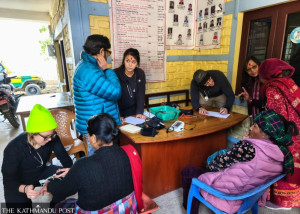Health
30 percent of postgrad doctors fail Nepal licensing test
Thursday’s test saw the highest number of failures.
Post Report
Nearly 30 percent of doctors who completed their master’s degree and sat a recent licensing test of the Nepal Medical Council failed to score the pass mark.
According to the council, the national regulatory body of medical doctors, only 175 out of 275 doctors who appeared for the exam passed the licensing test held on Thursday.
“Only those who secure the pass mark become specialist doctors,” said Dr Chop Lal Bhusal, chairman of the council. “Those who fail the licensing test have to retake the exam.”
The council conducts the licensing test for postgraduate doctors every four months. Those who fail can retake the exam until they pass.
This is not the first time such a large number of doctors have failed to secure the minimum pass mark needed to practise as consultant doctors.
Officials at the council said the average pass percentage for postgraduate doctors is around 70.
“Only 50 to 55 percent of doctors with an MBBS degree pass the licensing test, while around 70 percent of postgraduate doctors pass,” said Bhusal. “What is worrying is a lot of doctors with master’s degrees are failing to secure even the pass marks.”
To qualify as a medical practitioner, a doctor must secure at least 50 percent in the licensing exam. Experts say the quality of medical education is being compromised by underachievers who do not deserve to practise medicine entering the profession.
“Universities and colleges must pay closer attention to the results of the doctors they produce,” said Bhusal.
Licensing tests for medical doctors are a routine procedure in every country. Nepal’s licensing test focuses only on doctors’ knowledge. Some countries also conduct skill tests. Council officials said they had also planned to conduct skill tests in the past, but could not due to the lack of skill labs.
“Only the National Academy of Medical Sciences;, Tribhuvan University’s Institute of Medicine; and Kathmandu University’s Dhulikhel Hospital have skill labs,” said Dr Krishna Prasad Adhikari, former registrar of the Council. “We had planned to set up skill labs with support from various agencies, including the World Health Organisation, but things didn’t go as planned.”
The World Health Organisation said inaccurate diagnosis, medical errors, inappropriate or unnecessary treatment, inadequate or unsafe clinical facilities and practices, and healthcare providers who lack adequate training and expertise are present in all countries.
The UN health body says low-quality health care is increasing the burden of illness and health costs globally.




 10.12°C Kathmandu
10.12°C Kathmandu













